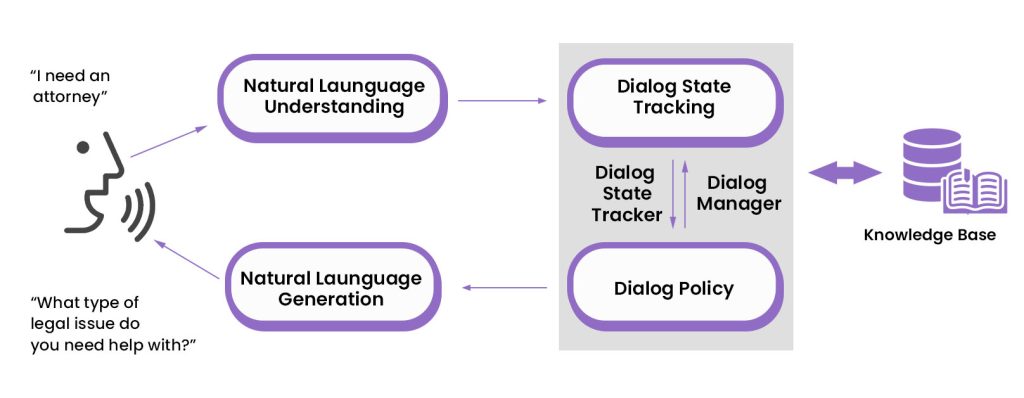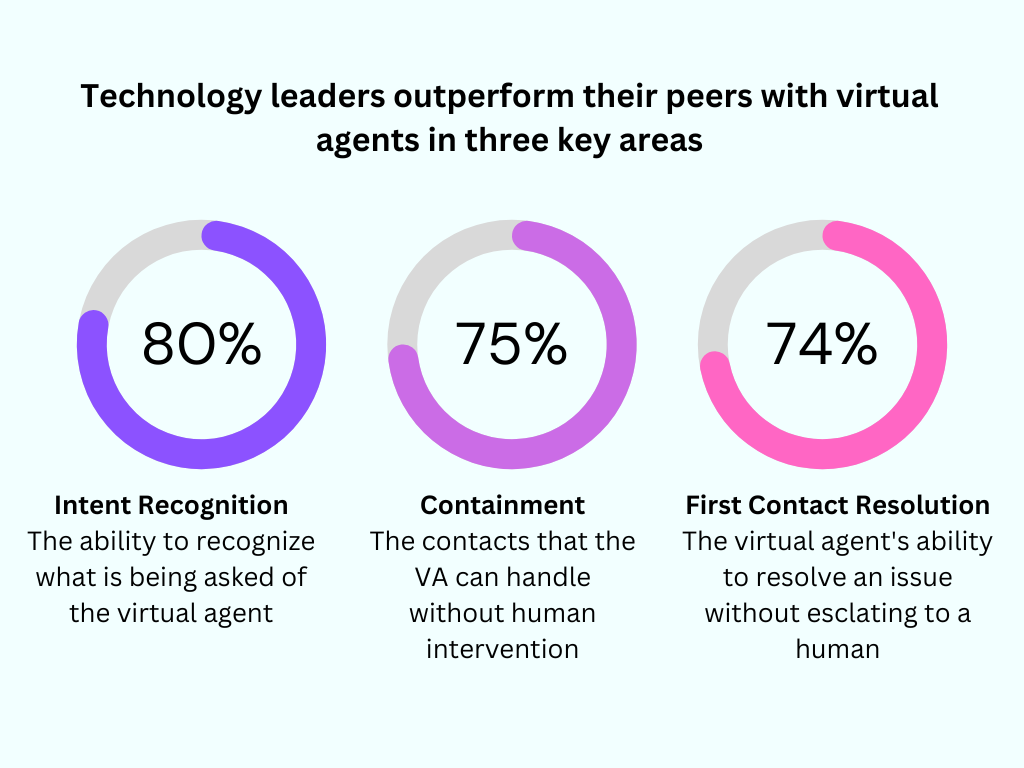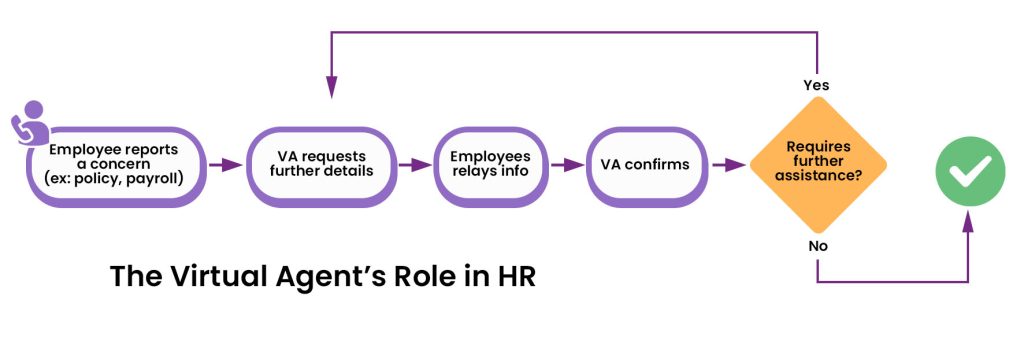
The future of business operations, where Artificial Intelligence (AI) is no longer a buzzword but an indispensable tool is finally here. If you’re a business leader, you’ve probably heard the term “virtual agent” thrown around in the discourse about AI. But what is a virtual agent, and more importantly, how can it change your business operations?
In this article we want to clarify the concept of virtual agents, highlighting their potential to streamline processes, improve efficiency, and elevate customer experience. We’ll look at how these AI-powered allies work, how they can be implemented in different areas of your business, and why they are fast becoming a crucial element of the digital business landscape.
So What Are Virtual Agents
In the world of AI, a virtual agent, sometimes also referred to as a digital agent, AI agent or intelligent virtual agent (IVA), serves as an autonomous entity that understands, processes, and communicates in human language. These agents are of the software variety and leverage advanced AI, machine learning, and natural language processing technologies to interact with humans or perform tasks on their behalf.
Intelligent virtual agents mimic human-like interactions, making them capable of engaging in meaningful conversations with users, answering queries, providing assistance, and even executing tasks. They can be employed across a range of interfaces, such as websites, mobile apps, and social media platforms, and are often embodied in the form of chatbots, virtual assistants, or voice assistants.

However, what distinguishes virtual agents from other AI tools is their ability to learn and adapt. As they interact with users, they gather and analyze data to refine their understanding and responses. This continuous learning enables them to provide more accurate, personalized, and context-specific assistance over time.
While their capabilities may sound like sci-fi, virtual agents are becoming increasingly common. Their capacity to streamline customer interactions and business processes has made them a preferred AI tool for businesses. But the magic of virtual agents isn’t limited to customer service. They have the potential to transform both internal and external operations of a business.
Benefits of Intelligent Virtual Agents
The benefits of virtual agents are wide-ranging and significant, transforming various aspects of business operations and customer engagement.
Now that we have a few years of case studies surrounding virtual agent technology (VAT), we are starting to see compile data for how exactly these virtual agents are helping organizations to reach new heights.
In 2021, the IBM Institute for Business Value (IBV), in cooperation with Oxford Economics released a report documenting statistics on the successes of organizations in 12 industries spanning 33 countries. Of those organizations polled, 96% of respondents have exceeded, achieved, or expect to achieve their anticipated return on investment for their virtual agent technology implementation.
96% of respondents have exceeded, achieved, or expect to achieve their anticipated return on investment for their virtual agent technology implementation
IBM Institute for Business Value (IBV), in cooperation with Oxford Economics
Firstly, virtual agents can operate 24/7, ensuring that customer inquiries and internal queries are addressed promptly, any time of day or night. This round-the-clock availability enhances customer service and staff support, making operations more efficient.
Second, virtual agents can handle a large volume of interactions simultaneously, a feat impossible for their human counterparts. This ability can significantly reduce wait times and increase overall productivity.
Virtual agents also contribute to cost-effectiveness. By automating routine and repetitive tasks, they free up human resources to focus on more complex and value-adding tasks.
Another critical advantage is their capacity for personalization. By analyzing data and user behavior, virtual agents can provide personalized experiences, improving customer satisfaction and boosting engagement.
Furthermore, virtual agents can provide invaluable insights. By tracking and analyzing interactions, they can help businesses understand customer behavior, preferences, and trends, leading to better decision-making and strategy formulation.

Not only are organizations making waves in their respective industries, they are dominating the competition specifically due to their adoption of intelligent virtual agents.
Virtual agents are a strategic investment that can drive operational efficiency, cost savings, and customer satisfaction, making them a valuable asset for businesses navigating the digital landscape.
Internal Applications of Virtual Agents
When we talk about virtual agents, the spotlight often falls on their customer-facing roles. However, their potential for internal applications holds equal value.
Virtual Agents in HR
One key area is Human Resources (HR). Virtual agents can streamline various HR tasks, such as handling routine inquiries about company policies, leave applications, or benefits, reducing the workload of HR personnel. They can also assist with recruitment processes, from collecting applications to scheduling interviews, accelerating hiring times.

Virtual Agents in IT
In IT support, virtual agents can act as the first line of defense, resolving common technical issues or guiding users through troubleshooting steps. This efficient handling of routine queries allows IT staff to concentrate on more complex problems.
Similarly, for operations and administration, virtual agents can automate repetitive tasks like data entry or appointment scheduling, enhancing productivity and accuracy.
Beyond these, virtual agents can also play a role in training and development. They can deliver personalized learning content, track progress, and even assess performance.
Implementing virtual agents internally can significantly improve operational efficiency and employee satisfaction. By handling routine tasks and providing instant support, they free up employees to focus on strategic, value-adding activities, making the business more agile and competitive.
External Applications of Virtual Agents
Externally, virtual agents serve as the digital face of a business, facilitating interactions with customers, clients, or the general public.
Virtual Agents for Customer Service
In customer service, virtual agents can provide instant responses to customer queries, manage bookings, or process orders, offering a seamless, personalized customer experience. They can be programmed to handle common queries or direct more complex issues to human agents, reducing wait times and enhancing customer satisfaction.
99% of respondents report an increase in customer satisfaction as a result of using virtual agent technology.
Virtual Agents for Sales Departments
Sales and marketing departments can also benefit from virtual agents. They can engage customers in interactive conversations, offer product recommendations based on customer preferences, or even upsell and cross-sell products, boosting sales and customer engagement.
Virtual agents can also be useful for gathering customer feedback. They can conduct surveys or collect reviews, providing valuable insights for business improvement.
Virtual Agents for Social Media
On the social media landscape, virtual agents can manage brand presence on various platforms, responding to comments, inquiries, and messages, maintaining a consistent and interactive brand image.
So, virtual agents can completely change how businesses interact with their customers. By providing instant, personalized, and efficient service, they can significantly enhance customer experience, brand loyalty, and ultimately, business success.
Implementing Virtual Agents
The implementation of virtual agents involves a strategic process, tailored to the needs and objectives of your business. Here are some key steps:
- Identify Needs and Goals: The first step is to identify the tasks you want your virtual agent to handle. Do you need it for customer support, sales, internal operations, or a combination of these?
- Choose the Right Platform: Based on your needs, choose a platform that supports the capabilities you require. Do you need text-based chatbots, voice-based virtual assistants, or a combination of both?
- Customize Your Virtual Agent: Customize your virtual agent to align with your brand voice and customer expectations. This includes the language, tone, and level of personalization.
- Train Your Virtual Agent: Use existing data to train your virtual agent. Over time, it will learn from interactions and improve its responses.
- Test and Iterate: Launch your virtual agent in a controlled environment first. Gather feedback, identify issues, and make necessary adjustments before a full-scale launch.
- Monitor and Optimize: Continuously monitor the performance of your virtual agent and optimize it based on feedback and data.
Implementing virtual agents is a dynamic process that requires careful planning, execution, and continuous improvement. For that reason, many organizations opt to contract an AI consultant to handle the build process. The benefits they bring make it a worthwhile investment.
The Future of Virtual Agents
Intelligent virtual agents have already reshaped the way businesses operate and interact with customers, but this is just the beginning. As AI technologies evolve, the capabilities of virtual agents will expand, opening up new possibilities and opportunities.
One significant development will be the increasing sophistication of natural language processing, enabling virtual agents to understand and respond to human language with even greater precision and nuance. This will enhance their ability to engage in more complex, context-aware conversations, improving their efficiency and effectiveness in customer service and internal operations.
Virtual agents will also become more proactive, anticipating user needs based on past interactions and contextual information. This will enable them to provide personalized assistance and recommendations even before users request them, enhancing user experience and engagement.
In terms of application, we can expect to see virtual agents integrated into more aspects of business operations and customer engagement, from marketing and sales to HR and IT support.
Furthermore, as businesses increasingly recognize the benefits of virtual agents, their adoption will become more widespread, transforming them from a competitive advantage into a business necessity.
Conclusion
As organizations embrace an AI-driven future, the role of virtual agents in transforming business operations and customer engagement is becoming increasingly evident. Whether you’re a small business looking to enhance customer service, a large organization aiming to streamline internal operations, or an ambitious startup seeking to differentiate itself, virtual agents can be a game-changing tool in your digital arsenal.
Adopting virtual agents is not just about embracing new technology. it’s about embracing a new way of doing business – one that is more efficient, more customer-centric, and more adaptable to changing needs and trends.
Kevin is a digital marketing expert with a previous 10 years worth of experience working in IT. He understands the nuances of sourcing the right IT resources to drive results for organizations.
